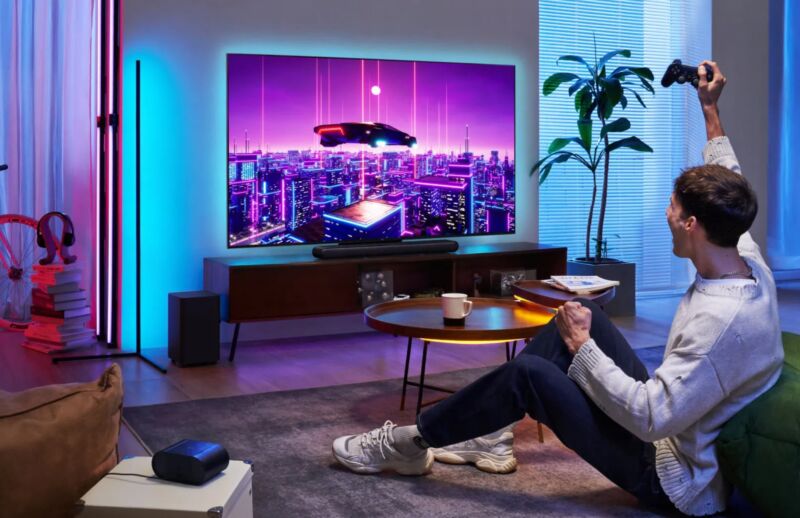
Enlarge / TCL’s C655 Pro TV is advertised as a quantum dot Mini LED TV.
TCL has come under scrutiny this month after testing that claimed to examine three TCL TVs marketed as quantum dot TVs reportedly showed no trace of quantum dots.
Quantum dots are semiconductor particles that are several nanometers large and emit different color lights when struck with light of a certain frequency. The color of the light emitted by the quantum dot depends on the wavelength, which is impacted by the quantum dot’s size. Some premium TVs (and computer monitors) use quantum dots so they can display a wider range of colors.
Quantum dots have become a large selling point for LCD-LED, Mini LED, and QD-OLED TVs, and quantum dot TVs command higher prices. A TV manufacturer pushing off standard TVs as quantum dot TVs would create a scandal significant enough to break consumer trust in China’s biggest TV manufacturer and could also result in legal ramifications.
But with TCL sharing conflicting testing results, and general skepticism around TCL being able to pull off such an anti-consumer scam in a way that would benefit it financially, this case of questionable colorful TVs isn’t so black and white. So, Ars Technica sought more clarity on the situation.
Tests unable to detect quantum dots in TCL TVs
Earlier this month, South Korean IT news publication ETNews published a report on testing that seemingly showed three TCL quantum dot TVs, marketed as QD TVs, as not having quantum dots present.
Hansol Chemical, a Seoul-headquartered chemicals company, commissioned the testing. SGS, a Geneva-headquartered testing and certification company, and Intertek, a London-headquartered testing and certification company, performed the tests.
The models examined were TCL’s C755, said to be a quantum dot Mini LED TV, the C655, a purported quantum dot LED (QLED) TV, and the C655 Pro, another QLED. None of those models are sold in the US, but TCL sells various Mini LED and LED TVs in the US that claim to use quantum dots.
According to a Google translation, ETNews reported: “According to industry sources on the 5th, the results of tests commissioned by Hansol Chemical to global testing and certification agencies SGS and Intertek showed that indium… and cadmium… were not detected in three TCL QD TV models. Indium and cadmium are essential materials that cannot be omitted in QD implementation.”
The testing was supposed to detect cadmium if present at a minimum concentration of 0.5 mg per 1 kg, while indium was tested at a minimum detection standard of 2 mg/kg or 5 mg/kg, depending on the testing lab.
These are the results from Intertek and SGS’s testing, as reported by display tech publication Display Daily:
| Testing Lab | TCL Model | Measured | Indium | Cadmium | Indium Minimum Detection Standard (mg/kg) | Cadmium Minimum Detection Standard (mg/kg) |
|---|---|---|---|---|---|---|
| Intertek | C755 | Sheet | Undetected | Undetected | 2 mg/kg | 0.5 mg/kg |
| Intertek | C655 | Diffusion Plate | Undetected | Undetected | 2 mg/kg | 0.5 mg/kg |
| SGS | C655 Pro | Sheet | Undetected | Undetected | 5 mg/kg | 0.5 mg/kg |
| SGS | C655 Pro | Diffusion Plate | Undetected | Undetected | 5 mg/kg | 0.5 mg/kg |
| SGS | C655 Pro | Sheet | Undetected | Undetected | 5 mg/kg | 0.5 mg/kg |